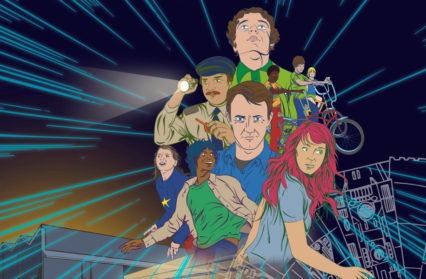Jafar Iqbal reviews Lightspeed from Pembroke Dock, a coming-of-age story incorporating Star Wars, superfandom, and nostalgia.
Pembroke Dock can proudly boast that, for a short period in 1979, the Millennium Falcon stopped by. What is now a little-known piece of Welsh history was once a formative experience for an entire generation of Welsh children, and it’s the inspiration for this charming new play by Mark Williams. In a story that flies back and forth from the late seventies to the present day, Williams crafts a story steeped in nostalgia.
At the centre of Lightspeed from Pembroke Dock is Star Wars superfan Sam. There is the rebellious twelve-year old boy, finding solace from his mother’s death in the George Lucas fantasy; and then there’s the middle-aged father, worn by a life of missed opportunities. Young Sam tries to find common ground with stepdad Mike, while elder Sam tries to mould daughter Lizzie in his own image. All of these stories play out like an eighties video game, enhanced by a superbly nostalgic score by Dan Lawrence.
Like the film franchise that it pays such loving homage to, Lightspeed from Pembroke Dock is a coming-of-age story disguised as an adventure yarn. Two major set pieces highlight this ninety-minute show, but it’s the characters met along the way that resonate most of all. Top of that list is Sam, a character that is carefully written and very well cast. Both incarnations of the character embody the best and worst in us, expertly played by Jack Hammett and Keiron Self. Hammett brings a spirit and a warmth to his performance that is delightfully infectious, while Self delivers the type of assured and confident turn we’ve come to expect from him. Self is one of Wales’ best comic actors, but there are fleeting moments of something much deeper here. If he hasn’t already, Self is coming dangerously close to being typecast as the bumbling fool, which is both a joy and a shame. A joy, because audiences get to see performances like this one; but a shame that examples of him doing something else are becoming limited.
Dick Bradnum and Sian Davies make up the rest of the ensemble cast for Lightspeed from Pembroke Dock, and both have varying levels of success. Davies does her best as Lizzie but the character isn’t always likable, with a two-dimensionally nagging demeanour suggesting that Williams isn’t as strong writing female characters. Bradnum has the unenviable task of being both the lightest relief and the darkest subplot. He is at his best when playing stepdad Mike, and the relationship between he and Sam is poignantly done. He doesn’t always hit the mark with the comedy characters but are fine as brief narrative devices.
A big legacy left behind Star Wars is the hundreds and thousands of DIY home movies it spawned. We see one example of this in the play, and it’s the route taken by director Catherine Paskell and designer Cadi Lane. Instead of traditional staging, the rough and ready set is built and taken down by the performers as needed in a manner that feels organic. It is brilliant when it works but, like with all home movies, its very obvious when it doesn’t, and that can be jarring.
For the most part, Paskell does a solid job of controlling the chaos on stage. Looking at her previous work, she seems to enjoy finding innovative ways to portray different dimensions simultaneously. Here, she manages to merge two timeframes without ever confusing matters. A lot of that credit also falls to lighting designer Ceri James. Paskell does lose some control when the play is at its most frenetic, but reins it in by the end for a pleasant ending.
It’s not a spoiler to declare that Lightspeed from Pembroke Dock ends in a crowd-pleasing way, complete with overt Star Wars reference. It does rush there, though. The story of Sam and Lizzie ends satisfyingly, but rather abruptly. It has a dampening effect on what is an otherwise charming and well-made piece of family theatre.
You might also like…
Carolyn Percy reviews Nick Park’s Early Man, which incorporates gorgeous stop-motion visuals and a strong sense of humour to create a fun prehistoric film.
Jafar Iqbal is a regular contributor to Wales Arts Review.












